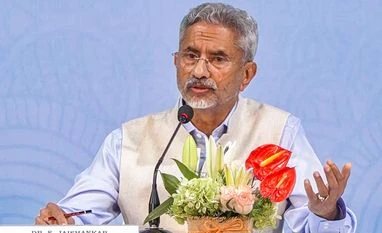State of border to determine state of relationship: EAM on ties with China
He said any relationship has to be based on a "high degree of mutuality" and there has to be respect for each other's interests and sensitivities
)
S Jaishankar (Photo: PTI)
Listen to This Article
The state of border will determine the state of relationship between India and China, External Affairs Minister S Jaishankar said on Wednesday amid an over three-year military standoff along the Line of Actual Control in eastern Ladakh.
"The state of the border today is still abnormal," Jaishankar said in an interactive session at an event here.
On ties with the US, Jaishankar described Prime Minister Narendra Modi's recent visit to Washington as "most productive" prime ministerial visit considering the solid outcome from the trip and that the relations between the two countries have become "exceptionally well".
Referring to India's ties with China, he said the relationship is going through a "difficult phase" because of violation of agreements relating to management of the border.
The Indian and Chinese troops are locked in the confrontation in certain friction points in eastern Ladakh even as the two sides completed disengagement from several areas following extensive diplomatic and military talks.
Also Read
"At the end of the day for us, we recognise that it (China) is a neighbour, it is a big neighbour. Today it is a very significant economy and significant power," Jaishankar said.
He said any relationship has to be based on a "high degree of mutuality" and there has to be respect for each other's interests and sensitivities.
"And there has to be an adherence to agreements which were reached between us and it is that departure from what was agreed between us is today at the heart of the difficult phase that we are passing through with Chinam," he said.
"The bottom line there is that at the end of the day, the state of the border will determine the state of the relationship and the state of the border today is still abnormal," Jaishankar said.
India has made it very clear to China that until there is peace and tranquillity in border areas, the relationship between the two countries cannot progress.
Jaishankar said ties with the US have grown in the past over two decades and cited Washington's exceptions for India including waivers on nuclear laws, export control and ensuring transfer of critical technologies.
"You can see that our relationship with the US is doing exceptionally well. I think we really have had the most productive prime ministerial visit," he said.
"We are really looking at what it is that the two countries can do together in terms of not just bilateral ties, but also in terms of how we can influence or shape the world together for our common purposes," Jaishankar said.
On India's relations with Russia, the ties are very unique and remain steady. Jaishankar said despite pressures on India over its ties with Russia, New Delhi has made its own evaluation on the importance of this relationship.
Sometimes this relationship is dumb down to things like India's dependence on defence supplies, he said.
"I think it is far more complex than that. There is a geopolitical logic for what we have been doing with Russia," he said.
He said today there is a focus on the economic part of the ties between Russia and India.
(Only the headline and picture of this report may have been reworked by the Business Standard staff; the rest of the content is auto-generated from a syndicated feed.)
More From This Section
Don't miss the most important news and views of the day. Get them on our Telegram channel
First Published: Jun 28 2023 | 11:17 PM IST


